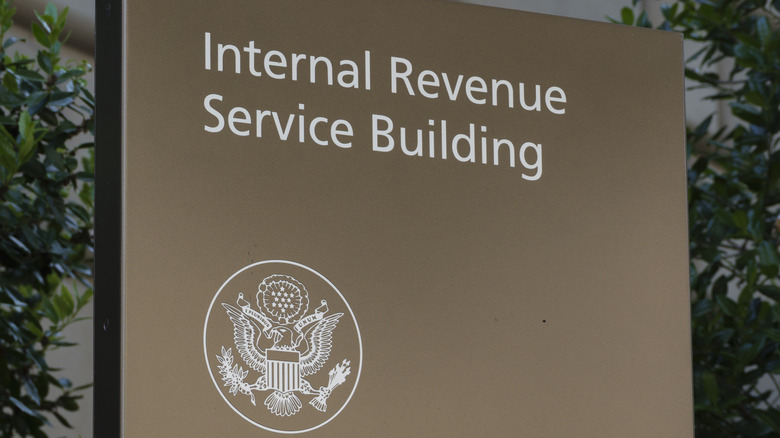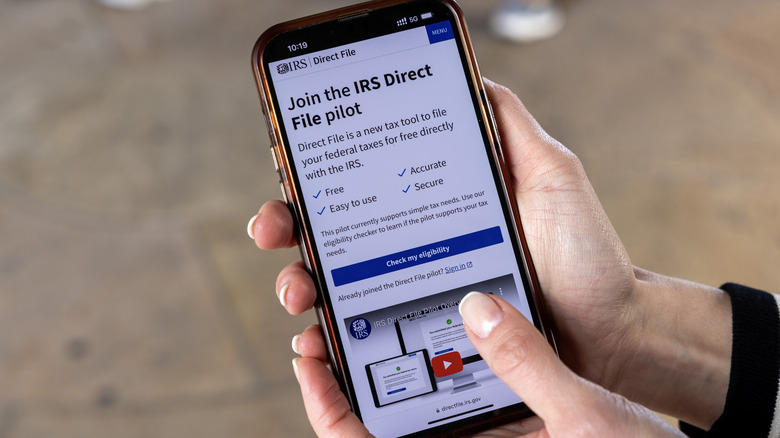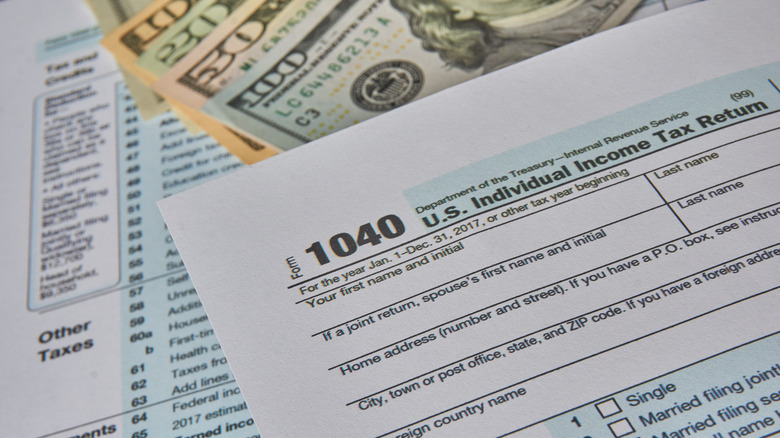The Easy Tax Filing System The IRS Is Getting Rid Of In 2026
A program that enabled taxpayers to file their federal income taxes for free online appears to have been killed by the Trump administration. At the very least, it won't be available for tax season in 2026.
The Associated Press reported that Internal Revenue Service (IRS) official Cynthia Noe informed state controllers that IRS Direct File would not be available for the 2026 filing seasons and that "no launch date has been set for the future." Treasury Secretary Scott Bessent, who now also serves as the acting IRS commissioner, told reporters two days later that there are "better alternatives" to Direct File.
Direct File was started under the Biden administration in early 2024 as a pilot program for taxpayers living in 12 states wishing to file their taxes online for free. By the 2025 filing season, Direct File was expanded to 24 states. Its purpose was to help save Americans money and time when filing their taxes. According to an October 2024 release from the U.S. Department of Treasury, the average American spent $270 in fees as well as 13 hours of their time filing taxes, and the program had gained popularity since its launch. An internal May 2025 IRS memo obtained by Nextgov/FCW showed that 94% of Direct File's surveyed users in the 2025 tax season rated their experience as either excellent or above average. That was up from 90% the previous year.
Direct File was opposed by Republicans, Elon Musk, and tax preparation companies.
Despite the program's popularity, the Trump administration declared its intent to halt Direct File in March 2025, when IRS staffers were ordered to stop working on the program's development, the AP reported. Indeed, then-DOGE head Elon Musk (who made claims on Social Security that aren't based on fact while trying to fire thousands of government workers) proclaimed in February 2025 on X that his team "deleted" federal tech workers tasked with running Direct File. Still, its use still grew from 140,803 filers in the 2024 tax season to 296,531 in the 2025 season, according to The Center for Taxpayer Rights (via AP).
Yet Republican critics of the program maintained that the Direct File was inefficient, costly, and constituted government overreach. Plus, less than 0.5% of the 146 million returns filed in the 2024 tax season used Direct File, a program that cost at least $41 million to run, per an October 2025 Ways and Means Report to Congress.
The concept was also opposed by private tax services that charge fees for preparing income tax returns. Those companies spent more than $39 million lobbying Congress on free filing matters between 2006 and 2023, AP reported. In 2006, the tax preparers' Free File Alliance and the IRS worked out an agreement through which several commercial tax preparation companies provide free tax services on the IRS website for people earning $73,000 a year or less, while the IRS was barred from launching its own free-file service (a provision that expired in 2019).
Other options to file taxes for free exist, but you might not qualify
With Direct File dead (or at least suspended in 2026), the hundreds of thousands of people who used that service will now need to either return to mailing in paper returns or find another online software program. Those options include working with IRS-certified volunteers, such as the AARP Foundation's Tax-Aide – which helped 1.7 million people in 2024 — or military members can also file their taxes for free, no matter what their income is, via the Department of Defense's MilTax.
There's also IRS Free File, where private tax preparers provide their services for free per the Free File Alliance deal, which is currently available for those making $84,000 or less a year. This service, though, has been used by just 3% of filers, and some participating companies have been found to have pushed people toward paid programs.
Finally, there are the more classic TurboTax vs. H&R Block options. Both companies offer a free service for those whose tax returns are limited to Form 1040 returns, with additional schedules restricted to earned income tax credit, child tax credit, and student loan interest. Under those restrictions, H&R Block claims that 52% of taxpayers would qualify for its Free Online program, while Intuit TurboTax estimated that 37% of filers would qualify for its Free Edition.


